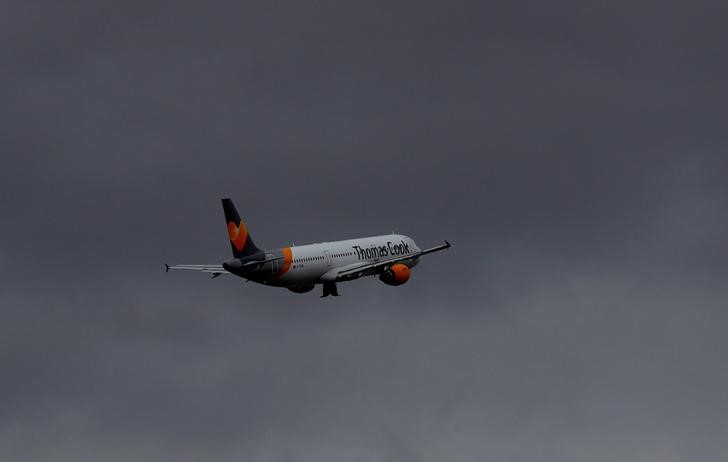By Alistair Smout
LONDON (Reuters) - UK travel stocks are sliding again as they face a perfect storm of political and security shocks that many predict will keep holidaying Britons at home for another year at least.
The hopes of tour operators such as Thomas Cook (L:TCG) that 2016 would see a pick-up in business have been dashed again as the British school holidays get under way. Its stock price has nearly halved since the start of this year.
After demand last year was hit by attacks in Tunisia, Egypt and Paris, last week's attack on Bastille Day in Nice and an attempted coup in Turkey have raised the prospect of further cancellations and another rough summer.
That, combined with a hit to sterling from Britain's vote to leave the European Union, has prompted some investors to look towards stocks that could benefit from a rise in "staycations" as British tourists look to take domestic breaks.
Thomas Cook was down 1.8 percent by 1421 GMT on Monday, with peer TUI slipping 2.3 percent, underperforming other travel and leisure stocks as analysts said bookings to Turkey may be hit by the abortive weekend coup.
After a 4 percent fall in profit for 2015, dented by Tunisia cancellations, Thomas Cook said last November that demand for 2016 was ahead of 2015. But even before the latest news from Turkey, it had acknowledged customers were delaying plans this year because of security concerns.
"For me it's a cumulative effect. We had Paris, and then Brussels, then France again and then a coup... It seems as though holidaymakers were delaying and hoping to book at the last minute, so a stock like Thomas Cook will be hit," said Mike Ingram, market strategist at BGC Partners.
"Given the depreciation of sterling, given the security concerns and given that people might opt for "staycations" at the last minute and not want to fly, I'd rather be going for stocks like Whitbread (LON:WTB)."
Whitbread, whose brands include Costa Coffee and budget hotel chain Premier Inn, is down 14 percent year-to-date but has bounced 9 percent from its post-referendum low.
Thomas Cook is down 48 percent so far in 2016, with TUI Group (L:TUIT) down over 20 percent. That compares to just a 9 percent fall for the broader Travel and Leisure (FTNMX5750) index.
UK-listed travel stocks performance since 2015: http://tmsnrt.rs/29HQStN
CHANGE OF PLANS
While the sector as a whole was jolted by the June 23 referendum, there is some sign that domestically exposed stocks are recovering. Pub chain JD Wetherspoons (L:JDW), whose boss backed Brexit, and coach company National Express (L:NEX) are back above their pre-vote levels.
By contrast, Thomas Cook, with a business model dependent on those wanting to travel to the sunnier parts of Europe and the Middle East, is down 13 percent since the vote. Traders said tour operators would be worse affected than airlines.
"Thomas Cook, for example, is heavily skewed towards Turkey, whereas airlines can benefit from a more geographical spread," said Atif Latif, director of trading at Guardian Stockbrokers.
"With this being the start of the holiday season and normally a busy time for tour operators, we could see more pressure as many change travel plans."
TUI, which runs Thomson, also cited instability in the Middle East and North Africa as affecting its 2015 results. In February it reported a 40 percent drop in bookings to Turkey after a suicide bombing there in January.
Travel firms also have to contend with a slump in sterling the wake of the Brexit vote, which has made foreign trips more expensive and could further encourage people to holiday at home.
Sterling hit 31-year lows against the dollar and a near-three year low against the euro, which also makes Britain significantly cheaper for foreign tourists.
"For the more domestically oriented UK leisure names, there might be areas where they see uplift," said BGC's Ingram.

"They might benefit both from redirected travel inwards from abroad, as well as any trend towards "staycations"."